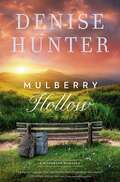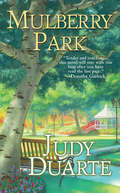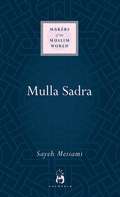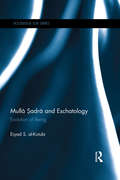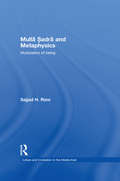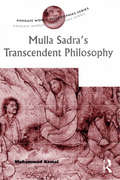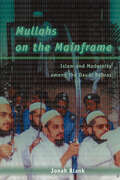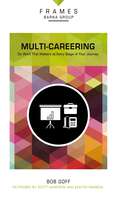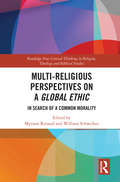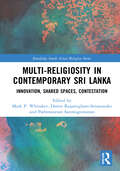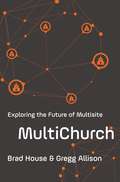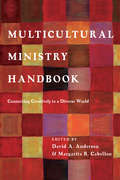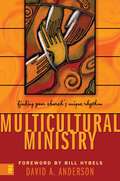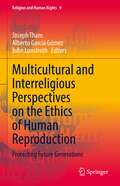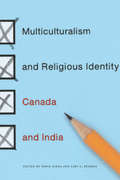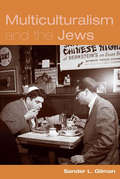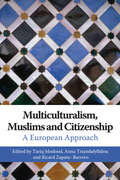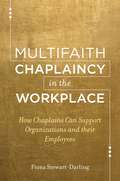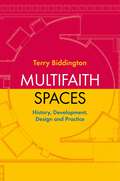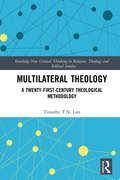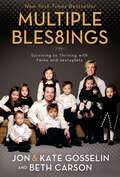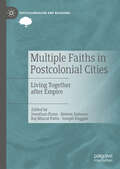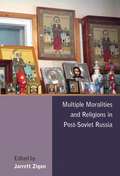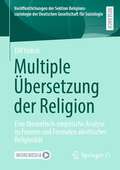- Table View
- List View
Mulberry Hollow (A Riverbend Romance #2)
by Denise HunterLiving life to the fullest always requires sacrifice.Avery Robinson decided to be a physician after helplessly watching her mother lose a battle with a terrible disease. Now at risk of developing the same illness, Avery guards her heart from love. She&’s driven to protect her loved ones as a workaholic doctor in the tiny mountain town of Riverbend Gap, North Carolina.Contractor Wes Garrett is hiking the Appalachian trail, in memory of the man who died saving his life, when an illness racks his body. After an agonizing fifteen-mile hike to Avery&’s clinic, he collapses on her doorstep. He recovers to find himself in debt again, this time to a beautiful doctor.When he decides to help her renovate a rundown carriage house, the obstacles to their attraction sprout like weeds—starting with the woman waiting for Wes at the end of the trail. Will he be able to relinquish the debt he owes his best friend? And will Avery find the courage to risk everything for love?The second book in Denise Hunter&’s popular Riverbend Romance series explores what it might be like to live fearlessly and free.&“A poignant romance that's perfect for fans of emotional love stories that capture your heart from the very first page. With her signature style, Denise Hunter whisks readers into a world where broken hearts are mended, lives are changed and love really does conquer all!&” —Courtney Walsh, New York Times bestselling authorSweet and thoughtful contemporary readBook 1: Riverbend Gap; Book 2: Mulberry Hollow; Book 3: Harvest MoonBook length: 86,000 wordsIncludes discussion questions for book clubs
Mulberry Park (Mulberry Park Ser.)
by Judy DuarteIn the San Diego suburb of Fairbrook, past Applewood Drive and up First Street, lies Mulberry Park, a peaceful haven for locals from all walks of life. And at the center of its lush green lawn grows a massive mulberry tree--tall enough to take a most precious wish as high as it can go, and to open a few hearts along the way. . .Each day after work, Claire Harper drives to Mulberry Park and jogs for miles, hoping to find a respite from her sadness. It's futile, until the evening a letter falls from its hiding place in a nearby tree. Inside the bright pink envelope emblazoned with the words "To God From Analisa," is a note written by a seven-year-old girl, urging God to look after her parents in Heaven and help those she loves on Earth. On impulse, Claire writes back, hoping to preserve Analisa's innocent belief in answered prayers--even if Claire lost her own faith. . .Gradually, Analisa's letters draw Claire out of her cocoon and into the companionship of other Mulberry Park regulars--all, in their own way, in need of comfort. As friendships grow, each will discover just how far one simple letter can reach. . ."An uplifting story about one little girl's unflinching faith and how she extends an open and loving hand to the broken people around her, bringing them close to each other and back into God's gentle embrace." --Cathy Lamb, author of Henry's Sisters
Mulla Sadra (Makers of the Muslim World)
by Sayeh MeisamiMulla Sadra (1572-1640) is perhaps the single most important and influential philosopher in the Muslim world. The author of over forty works, he sought to bring to life the whole heritage of Islamic thought, from philosophy to mysticism, and create a more flexible and conciliatory approach to the problems which seemed to dissociate reason from faith. In this wide-ranging profile, Sayeh Meisami reaches beyond historical narrative to assess the true impact of the man and his ideas. This thought provoking and comprehensive account is ideal for readers interested in uncovering the life and thoughts of a man who represents the climax of intellectual tradition at a crucial point in the history of Islamic civilization.
Mulla Sadra and Eschatology: Evolution of Being (Routledge Sufi Series)
by Eiyad S. Al-KutubiThe book explains Sadrā’s theory of the nature of afterlife. It presents Sadrā’s philosophical premises concerning the nature of human beings and their physical and psychological developments through which Sadrā shows how the afterlife is intimately connected to the nature of the human being and how it is a natural stage of the evolution of each individual in which a corporeal body has no role. Presenting Mullā Sadrā in a new light, the aim of this book is to investigate Sadrā’s metaphysical principles of the Return (al-ma‘ād) that have been either partially presented or misunderstood in most of the existing secondary literature. Focusing on Sadrā’s philosophical works, specifically the Asfār and his commentary on the Quran, this study demonstrates how Sadrā is a philosopher able to carry the premises of the previous philosophical theories to radically different conclusions. Mullā Sadrā and Eschatology demonstrates the manner in which Sadrā explains the Return as presented in the Quran and Hadith, but also shows how he presents the Return as a natural stage of the evolution of human beings in which a corporeal body has no role. Thus, Sadrā offers a plausible philosophical explanation to the problem of bodily resurrection that had occupied Muslim philosophers for centuries. Explaining Mullā Sadrā ‘s distinctive method of "doing" philosophy, this book will be of interest to students and scholars of Islamic Philosophy, Religion and Islamic Studies more broadly.
Mulla Sadra and Metaphysics: Modulation of Being (Culture and Civilization in the Middle East)
by Sajjad H. RizviMulla Sadra is one of the most important Islamic philosophers after Avicenna. In this exploration of his philosophy, Sajjad H. Rizvi examines the central doctrine of the modulation of being, and contextualises his work within the intellectual history of philosophical traditions in the Islamic East. Reading and critiquing the works of Mulla Sadra from an analytical perspective, this book pays particular attention to his text the Asfar, a work which, due to its complexity, is often overlooked. Looking at the concept of philosophy as a way of life and a therapeutic practice, this book explores the paradigm of the modulation of being in the philosophical method and metaphysics of Mulla Sadra and considers its different manifestations. Rizvi relates his philosophy to larger trends and provides a review of the field, charting and critiquing the discussion on the topic to date and exploring recent thought in this direction, to show how Sadrian thought was addressed well into the 19th and 20th centuries. This major contribution to the study of Mulla Sadra and the intellectual life of the Safavid period fills an important gap in the field of Sadra studies and Islamic philosophy, and is indispensable to students of philosophy, religion and Islamic studies, and Islamic philosophy in particular.
Mulla Sadra's Transcendent Philosophy (Ashgate World Philosophies Series)
by Muhammad KamalSadradin Shirazi (1571-1640), known also as Mulla Sadra, spoke of the primacy of Being and promoted a new ontology, founding a new epistemology. Mulla Sadra's ontology is an important philosophical turn and contribution to the understanding of the development of Muslim philosophy and thought. This comprehensive study of Mulla Sadra's philosophical thought explores his departure from tradition; his turn to the doctrine of the primacy of Being; the dynamic characteristics of Being and the concept of substantial change; comparisons with Heidegger's fundamental ontology; and the influence of Mulla Sadra's ontology on subsequent Muslim philosophy. Of particular value to students of philosophy, Islamic and Middle Eastern studies, philosophy of religion, and general readers who seek to understand Muslim philosophy, this book explores the significance of the doctrine of Mulla Sadra and its impact on subsequent debates in the Muslim world.
Mullahs on the Mainframe: Islam and Modernity among the Daudi Bohras
by Jonah BlankIn Jonah Blank's important, myth-shattering book, the West gets its first look at the Daudi Bohras, a unique Muslim denomination who have found the core of their religious beliefs largely compatible with modern ideology. Combining orthodox Muslim prayer, dress, and practice with secular education, relative gender equality, and Internet use, this community serves as a surprising reminder that the central values of "modernity" are hardly limited to the West.
Multi-Careering: Do Work That Matters at Every Stage of Your Journey (Frames)
by Bob Goff Barna GroupJob changes. Restructures. A waning passion. Retirement. A new 'norm' for length at any job. All of these, and more, lead us to wonder about the legacy we are leaving this world. Are we leaving it better than we found it? Are we able to separate our identity from our career? Maybe you know the deep passion you recently discovered (or re-discovered), that lay dormant for 30 years. Or perhaps you don't know yet what that calling is, but you know there is more than what you are doing now. Join Bob Goff, founder of Restore International, in this Barna Frame as you explore a biblical perspective on the legacy you are leaving, even as you face a career transition.
Multi-Religious Perspectives on a Global Ethic: In Search of a Common Morality (Routledge New Critical Thinking in Religion, Theology and Biblical Studies)
by William Schweiker Myriam RenaudRatified by the Parliament of the World’s Religions in 1993 and expanded in 2018, "Towards a Global Ethic (An Initial Declaration)," or the Global Ethic, expresses the minimal set of principles shared by people—religious or not. Though it is a secular document, the Global Ethic emerged after months of collaborative, interreligious dialogue dedicated to identifying a common ethical framework. This volume tests and contests the claim that the Global Ethic’s ethical directives can be found in the world’s religious, spiritual, and cultural traditions. The book features essays by scholars of religion who grapple with the practical implications of the Global Ethic’s directives when applied to issues like women’s rights, displaced peoples, income and wealth inequality, India’s caste system, and more. The scholars explore their respective religious traditions’ ethical response to one or more of these issues and compares them to the ethical response elaborated by the Global Ethic. The traditions included are Hinduism, Engaged Buddhism, Shi‘i Islam, Sunni Islam, Confucianism, Protestantism, Catholicism, Judaism, Indigenous African Religions, and Human Rights. To highlight the complexities within traditions, most essays are followed by a brief response by an expert in the same tradition. Multi-Religious Perspectives on a Global Ethic is of special interest to advanced students and scholars whose work focuses on the religious traditions listed above, on comparative religion, religious ethics, comparative ethics, and common morality.
Multi-religiosity in Contemporary Sri Lanka: Innovation, Shared Spaces, Contestations (Routledge South Asian Religion Series)
by Mark P. WhitakerThis book presents a collection of original research about every day, innovative, interactive, and multiple religiosities among Sri Lankan Buddhists, Hindus, Muslims, Christians, and devotees of New Religious Movements in post-war Sri Lanka. The contributors examine the unique and innovative religiosity that can be observed in Sri Lanka, which reveals a complex reality of mingled, and even simultaneous, cooperation and conflict. The book shows that innovative religious practices and institutions have achieved a new prominence in public life since the end of Sri Lanka’s civil war in 2009. Using the analytic framework of ‘innovative religiosity’ to allow researchers to look at this question between and across Sri Lanka’s plural religious landscape in order to escape both the epistemological and ethnographic isolation of studies that limit themselves to one form of religious practice, the chapters also investigate the extent to which inter-religious tolerance is still possible in the wake of Sri Lanka’s religion-involving civil war, and the continuing influence of populist Buddhist nationalism, globalization and geopolitics on Sri Lanka’s post-war governance. The book offers a novel approach to the study of post-conflict societies and furthers the understanding of the status of tolerance between religious practitioners in contexts where both ethnic conflict and multi-religious sites are prominent. This book is an important resource for researchers studying Anthropology, Asian Religion, Religion in Context and South Asian Studies.
MultiChurch: Exploring the Future of Multisite
by Gregg Allison Brad HouseIs it time for your church to go multisite? It seems everybody is doing it these days, so how do you know if it is the right solution for your congregation? MultiChurch brings clarity to the multisite movement and assembles the lessons it has learned over the past fifteen years. It explores the opportunities presented by the various forms of multi-site church, identifies areas of concern, and concludes that multisite is not only a biblically sound ecclesiological model, but also a model that provides a compelling solution to contemporary reductionism in the church.
Multicultural Ministry Handbook: Connecting Creatively to a Diverse World (BridgeLeader Books)
by David A. Anderson Margarita R. CabellonThe world is becoming increasingly diverse. More and more of our neighbors are from a variety of cultures, ethnicities and cultural backgrounds. But most churches are still culturally homogenous and do not represent every tribe and tongue. What can we do to minister more effectively to our multicultural society? David Anderson and Margarita Cabellon bring together an experienced team of practitioners to share best practices for multicultural ministry. First they lay out the biblical rationale for multicultural community as God's vision for his people. Then key leaders share personal journeys and practical ideas for multicultural leadership development, worship, children's ministry, outreach and much more. Drawing on the pioneering expertise of Bridgeway Community Church and BridgeLeader Network, the contributors present a holistic and multifaceted portrait of what a dynamic, grace-filled and diverse ministry can look like. Our tribalized world is crying out for healing. Discover how you can minister to others as agents of God's reconciliation and hope.
Multicultural Ministry: Finding Your Church's Unique Rhythm (Bridgeleader Bks.)
by Bill Hybels David A. AndersonDavid Anderson writes about multicultural leadership not from the perspective of an ivory tower intellectual, but as a hands-on practitioner who loves and believes in the body of Christ. . . . If you believe there is no solution to the race problem, I urge you to reconsider and to learn from someone who is on the frontlines of making multicultural ministry a reality in the church today. —Bill Hybels, founding and senior pastor, Willow Creek Community Church Multiculturalism isn’t a trend, it’s a reality. Evidence of this country’s rich racial mix is all around us in our schools, our stores, our neighborhoods, our recreational facilities—everywhere except our churches. Heaven may include every culture, tongue, and tribe, but in the United States, Sunday morning remains one of the last bastions of ethnic separatism. It’s time to stop merely talking about multicultural worship and start living it. In this groundbreaking book, David Anderson invites us all—African-American, Asian, Caucasian, and Latino—to learn how to dance the dance of multicultural ministry. We’ve all got different moves, but that’s the beauty of diversity: the various gifts we bring, the wisdom of our heritages, the different creative ways we express the same Lord. Think it can’t be done? Think again. As Anderson demonstrates, it is being done successfully by more and more churches. Wherever your church is now on the multicultural continuum, you can join the ranks of those moving toward a diverse and thriving ministry. Combining frontline insights with inspiring stories, Anderson takes you and your church into the strategy-level realities of what it takes to make multicultural ministry work in your setting. Do you hear the beat of the Spirit? God is calling your church to the dance of unity in diversity. Don’t hold back! Grab this book, get out on the dance floor, and let Multicultural Ministry show you the steps. Includes a Racial Reconciliation survey and six-session Racial Reconciliation curriculum.
Multicultural and Interreligious Perspectives on the Ethics of Human Reproduction: Protecting Future Generations (Religion and Human Rights #9)
by Joseph Tham Alberto Garcia Gómez John LunstrothThis book includes a number of distinct religious and secular views on the anthropological, ethical and social challenges of reproductive technologies in the light of human rights and in the context of global bioethics. It includes contributions of bioethics experts from six major religions—Buddhism, Confucianism, Christianity, Islam, Hinduism and Judaism—as well as secular authors. The chapters include commentaries discussing the content cross-religious/secular tradition to give a comparative perspective. Not only the volume editors but also the contributing authors took part in reviewing each others’ chapter making this a unique collected volume, not common in interreligious dialogue today. This text appeals to researchers and students working in the fields of bioethics and religious/secular studies.
Multiculturalism and Religious Identity
by Sonia Sikka Lori G. BeamanHow, and to what extent, can religion be included within commitments to multiculturalism? Multiculturalism and Religious Identity addresses this question by examining the political recognition and management of religious identity in Canada and India. In multicultural policy, practice, and literature, religion has until recently not been included within broader discussions of multiculturalism, perhaps due to worries of potential for conflict with secularism. This collection undertakes a contemporary analysis of how the Canadian and Indian states each approach religious diversity through social and political policies, as well as how religion and secularism meet both philosophically and politically in contested public space. Although Canada and India have differing political and religious histories - leading to different articulations of multiculturalism, religious diversity, and secularism - both countries share a commitment to ensuring fair treatment for the different religious communities they include. Combining broader theoretical and normative reflections with close case studies, Multiculturalism and Religious Identity leads the way to addressing these timely issues in the Canadian and Indian contexts.
Multiculturalism and Religious Identity: Canada and India
by Sonia Sikka Lori G. BeamanHow, and to what extent, can religion be included within commitments to multiculturalism? Multiculturalism and Religious Identity addresses this question by examining the political recognition and management of religious identity in Canada and India. In multicultural policy, practice, and literature, religion has until recently not been included within broader discussions of multiculturalism, perhaps due to worries of potential for conflict with secularism. This collection undertakes a contemporary analysis of how the Canadian and Indian states each approach religious diversity through social and political policies, as well as how religion and secularism meet both philosophically and politically in contested public space. Although Canada and India have differing political and religious histories - leading to different articulations of multiculturalism, religious diversity, and secularism - both countries share a commitment to ensuring fair treatment for the different religious communities they include. Combining broader theoretical and normative reflections with close case studies, Multiculturalism and Religious Identity leads the way to addressing these timely issues in the Canadian and Indian contexts.
Multiculturalism and the Jews
by Sander GilmanIn this powerful and wide-ranging study, Sander Gilman explores the idea of 'the multicultural' in the contemporary world, a question he frames as the question of the relationship between Jews and Muslims. How do Jews define themselves, and how are they in turn defined, within the global struggles of the moment, struggles that turn in large part around a secularized Christian perspective? Gilman uses his subject to unpack a sequence of important issues: what does it mean to be multicultural? Can the experience of diaspora Judaism serve as a useful model for Islam in today's multicultural Europe? What is a multicultural ethnic? Other chapters look at specific figures in Jewish cultural history – Albert Einstein, Franz Kafka, Israel Zangwill, Philip Roth, the hermaphrodite N.O. Body (aka Karl Baer, raised as Martha Baer) – to explore issues within Jewish identity. Throughout, Gilman pays keen attention to the ways in which contemporary literature – Chabon, Ozick, Zadie Smith, Jonathan Safran Foer, Gary Shteyngart – taking the idea of Jewishness and multiculturalism into new arenas.
Multiculturalism, Muslims and Citizenship: A European Approach
by Tariq Modood Anna Triandafyllidou Ricard Zapata-BarreroThis informative collection investigates the European dimension of multiculturalism and immigration. It argues that political theory discourse of multiculturalism and resulting EU policies assume an interpretation of liberalism developed chiefly from the American experience, and that this issue must be addressed as the European experience is entirely different (with the main influx being non-white, ethnic and religious groups challenging liberalism and existing notions of citizenship). Presenting a fresh and unique perspective of multiculturalism and citizenship in Western Europe today, this book offers a comparative series of national case studies by a diverse range of leading scholars that together provide a theoretical framework for the volume as a whole. The contributors investigate the extent to which we can talk about a common Europe-wide multiculturalism debate, or whether here too there is a Europe of two (or more) gears, in which some countries address multicultural claims swiftly whilst others lag behind, busy with more basic issues of immigrant acceptance and integration. Comprehensive and interdisciplinary, this text is essential reading for advanced undergraduates, researchers and policy makers interested in immigration, multiculturalism, European integration, Islamic studies and ethnicities.
Multifaith Chaplaincy in the Workplace: How Chaplains Can Support Organizations and their Employees
by Fiona Stewart-DarlingAs the global marketplace grows and becomes more complex, increasing stress is placed upon employees. Businesses are acknowledging this change in work habits by adapting the work place to offer support through multifaith chaplaincy. Multifaith chaplaincy is based on developing relationships of trust between diverse faith communities and the public workplace. Through the experience of starting the first multifaith chaplaincy in Canary Wharf, the author offers insights into current conditions and challenges of chaplaincy in the business community. Writing as an Anglican priest, Fiona Stewart-Darling shows the importance of chaplaincy teams drawing on different faith traditions. This book is an important contribution to the emerging debate around the role of chaplaincy in faith and business communities. This research will be of particular interest to those working in or setting up chaplaincies in different contexts such as hospitals, prisons, town centre chaplaincies working with businesses and business leaders, particularly those involved in diversity and inclusion in the workplace.
Multifaith Spaces: History, Development, Design and Practice
by Terry BiddingtonIn multifaith space, different religious world views come together in a way that mirrors the multicultural life experience of people living in towns and cities across the world. These spaces can highlight complex and sensitive issues to do with political and social tensions around the emergence of increasingly densely urbanised populations. At the same time, they also hold out the possibility of encouraging or promoting neighbourliness, dialogue, hospitality and shared activity for the betterment of the community.This book explores the history, development, design and practicalities of multifaith spaces. From early shared religious buildings that had to cater for the spiritual rituals of two or more faiths, to the shared multifaith spaces of modern secular locations such as universities, airports and hospitals, author Terry Biddington looks at the architectural, theological, social, legal and practical complexities that arise from the development and use of such spaces. The book also draws together research to enable further development of multifaith spaces.
Multilateral Theology: A 21st Century Theological Methodology (Routledge New Critical Thinking in Religion, Theology and Biblical Studies)
by Timothy T.N LimThis book introduces a new "multilateral" methodology for the contemporary study of theology. It bases this methodology on the idea that there are too many materials contributing as sources for theologizing to sustain the "one method fits all" approach found in many systematic theologies within Christianity. What is needed instead is something that reflects the various and varied natures, purposes, and tasks of theologians’ theologizing for their respective contexts. Engaging materials from a range of Christian traditions, including Evangelicalism, the Catholic Magisterium, and a limited range of pan-Orthodox resources, the book analyzes and assesses major factors that have shaped different streams of theology. Addressing doctrinal development, scripture and revelation, historical tradition and creeds, philosophy and truth, sciences and interdisciplinarity, experience, religious pluralism, and culture, it demonstrates how these various streams can form a multilateral whole. The book concludes by examining the centers and peripherals of methodologies in theologization for a spectrum of theological traditions/streams, both across and beyond Christianity. By offering an approach that keeps in step with the increasingly interconnected and pluralistic world in which we live, this book provides a vital resource for any scholar of Christian theology, constructive theology, contextual theologies, and systematic theology, as well as religious studies.
Multiple Blessings: Surviving to Thriving with Twins and Sextuplets
by Beth Carson Jon GosselinEight children in three years? Impossible! Kate and Jon Gosselin have learned that, through God, all things are possible—though sometimes slightly improbable. Just three years after giving birth to twin daughters, Kate and Jon learned they were pregnant again—with sextuplets. In Multiple Blessings, Kate candidly chronicles the emotional and exhausting challenges she and Jon faced from the time the babies were conceived through the first two years of their lives. This amazing story of faith provides a heartening lesson in what it means to trust the faithful hand of God to provide the strength and courage to make it through life’s seemingly impossible situations.
Multiple Faiths in Postcolonial Cities: Living Together after Empire (Postcolonialism and Religions)
by Jonathan Dunn Heleen Joziasse Raj Bharat Patta Joseph DugganThis book addresses the challenges of living together after empire in many post-colonial cities. It is organized in two sections. The first section focuses on efforts by people of multiple faiths to live together within their contexts, including such efforts within a neighborhood in urban Manchester; the array of attempts at creating multi-faith spaces for worship across the globe; and initiatives to commemorate divisive conflict together in Northern Ireland. The second section utilizes particular postcolonial methods to illuminate pressing issues within specific contexts—including women’s leadership in an indigenous denomination in the variegated African landscape, and baptism and discipleship among Dalit communities in India. In the context of growing multiculturalism in the West, this volume offers a postcolonial theological resource, challenging the epistemologies in the Western academy.
Multiple Moralities And Religions In Post-soviet Russia
by Jarrett ZigonIn the post-Soviet period morality became a debatable concept, open to a multitude of expressions and performances. From Russian Orthodoxy to Islam, from shamanism to Protestantism, religions of various kinds provided some of the first possible alternative moral discourses and practices after the end of the Soviet system. This influence remains strong today. Within the Russian context, religion and morality intersect in such social domains as the relief of social suffering, the interpretation of history, the construction and reconstruction of traditions, individual and social health, and business practices. The influence of religion is also apparent in the way in which the Russian Orthodox Church increasingly acts as the moral voice of the government. The wide-ranging topics in this ethnographically based volume show the broad religious influence on both discursive and everyday moralities. The contributors reveal that although religion is a significant aspect of the various assemblages of morality, much like in other parts of the world, religion in postsocialist Russia cannot be separated from the political or economic or transnational institutional aspects of morality.
Multiple Übersetzung der Religion: Eine theoretisch-empirische Analyse zu Formen und Formaten alevitischer Religiosität (Veröffentlichungen der Sektion Religionssoziologie der Deutschen Gesellschaft für Soziologie)
by Elif YıldızlıDas Anliegen der vorliegenden Untersuchung ist es, mit der Theorie der multiplen Differenzierung einen soziologischen Blick auf Religion und die besonderen Übersetzungsverhältnisse am Beispiel der organisations- und milieuspezifischen Lage der Aleviten in der Türkei zu werfen. Dabei werden die spezifischen Anerkennungs-, Aushandlungs- und Transformationsprozesse der alevitischen Glaubensgemeinschaft betrachtet. Elif Yıldızlı arbeitet die Spannungen im Kontext von Religion in der modernen Gesellschaft und die Paradoxien zwischen verschiedenen (religiösen) Formen und der Funktion der sozialen Integration heraus. Dafür ist die Konzeptualisierung der Differenzierung u. a. zwischen (alevitischer) Organisation und (alevitischem) Milieu notwendig. Somit trägt diese Arbeit mit einer aufwendigen theoretisch-empirischen Analyse zur (religions-) soziologischen Erforschung verschiedener Integrationsformen der Aleviten bei als Beispiel für die Ausdifferenzierung einer neuen religiösen Milieutypologie.
